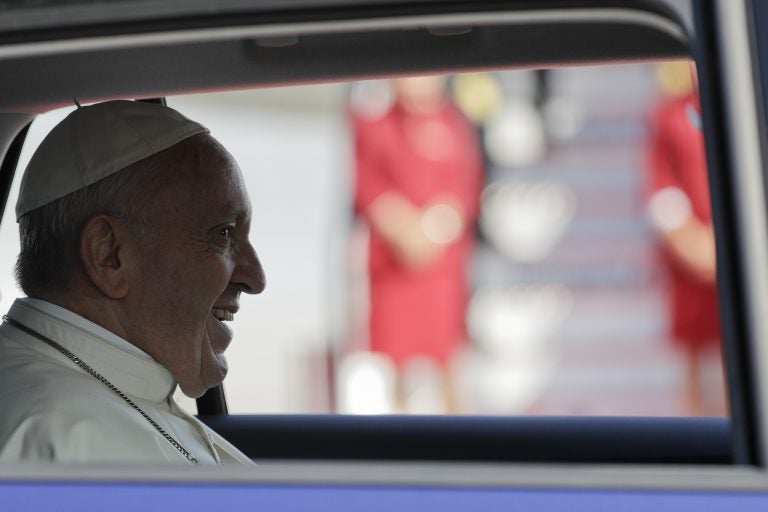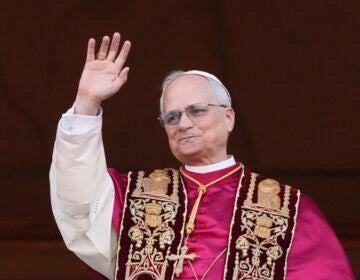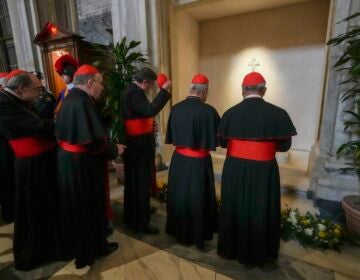Pope visits Ireland amid new global outrage over sex abuse
Pope Francis arrived Saturday in Ireland, ground zero of the Catholic Church's sex abuse crisis

Pope Francis sits in a car as he arrived at Dublin international airport, Ireland, Saturday, Aug. 25, 2018. Pope Francis is on a two-day visit to Ireland. (AP Photo/Gregorio Borgia)
Pope Francis arrived Saturday in Ireland, ground zero of the Catholic Church’s sex abuse crisis, with the institution under fire across the globe for its systemic failures to protect children or to punish bishops who hid the crimes.
Francis was expected to meet with victims during his 36-hour trip, the first papal visit to Ireland in almost four decades, and will have “many opportunities” to speak out about abuse, the Vatican said.
But neither Francis’ words nor a new meeting with abuse victims is likely to calm the outrage among rank-and-file Catholics following new revelations of sexual misconduct and cover-up in the United States, an ongoing crisis in Chile and prosecutions of top clerics in Australia and France.
Ireland has had one of the worst records of abuse in the world, crimes that were revealed to the deeply Catholic nation’s 4.8 million people through a series of government-mandated inquiries over the past decade. The reviews concluded that thousands of children were raped or molested by priests and physically abused in church-run schools while bishops covered up for abusers.
After the Irish church atoned for its past and enacted tough new norms to fight abuse, it had been looking to the first visit by a pope in 40 years to show a different, more caring church that understands the problems of ordinary Catholic families today.
More than 37,000 people — most of them young Catholics — signed up to attend a Vatican-sponsored World Meeting of Families that started in Dublin on Tuesday and runs through Sunday, more than twice the number as for the last family rally held in Philadelphia three years ago.
And many faithful were hopeful.
“I see a lot of new life amongst young people who have a deep committed faith, Catholic faith,” said Sean Ascogh, a churchgoer at a recent service in Blessington southwest of Dublin. “Obviously, they are very disappointed by what has been happening in the church in the last few years, particularly the whole abuse scandals, but I think people can see beyond that.”
But Ireland’s tortured history of abuse has left its mark.
In a country where Catholic bishops held such sway that they advised the drafters of the republic’s constitution in the 1930s, voters in recent years have turned their backs on core Catholic teachings. They have overturned a constitutional ban on abortion and legalized divorce, contraception and same-sex marriage.
Prime Minister Leo Varadkar, who will greet Francis at Dublin Castle on Saturday, is openly gay.
Francis was welcomed on the tarmac of Dublin International Airport by a small official delegation mostly composed of clergy, but no public crowd as would be the norm, especially in a Catholic country.
Irish abuse victims and their supporters were expected to hold a solidarity rally on Sunday in Dublin, at the same time Francis is celebrating his final Mass to close out the family conference.
Separately, survivors of Ireland’s wretched “mother and baby homes” — where children were exiled for the shame of having been born to unwed mothers — are holding their own demonstration Sunday. The location is Tuam, site of a mass grave of hundreds of babies who died over the years at a church-run home.
Francis will be nearby, visiting the Marian shrine at Knock, but has no plans to visit the grave site.
On the eve of Francis’ arrival in Dublin, Boston Cardinal Sean O’Malley — the pope’s top abuse counselor — said protecting children and vulnerable adults was now the single most crucial issue facing the church.
“All endeavors at evangelization and other great works will be dependent upon our ability to own our crimes and failings and to make the protection of children and vulnerable adults our No. 1 priority,” O’Malley said in a statement read out to a safeguarding panel at the World Meeting of Families.
O’Malley had been expected to headline the panel in person, but he backed out at the last minute, citing a new inquiry he launched into his diocesan seminary amid sexual misconduct allegations — one of three big U.S. seminaries that have launched such investigations in recent weeks.
Irish abuse survivor and advocate Marie Collins, who resigned in frustration from O’Malley’s board last year, told the safeguarding panel that if Francis claims to be on the side of victims, the Catholic Church should no longer lobby to block the ability of victims to sue and prosecute abusers after the statute of limitations expires.
“The actions of the church do not match the words, and they are in fact totally the opposite,” Collins said. She called for “robust structures” and strong sanctions to hold accountable bishops and even Vatican officials who fail protect children.
But Francis offered no such structures or sanctions in a letter he penned on the eve of his Irish visit to the world’s 1.2 billion Catholics, vowing only to spare no effort to fight the abuse problem. He has vowed “zero tolerance” since the start of his pontificate.
Francis’ first speech in Ireland on Saturday is an address to Irish government officials and civil society, where he will likely refer to the scandal. In the evening, he presides over a vigil. On Sunday, after praying at Knock, Francis celebrates the final Mass in Dublin’s Phoenix Park before returning to Rome.
When St. John Paul II visited Ireland in 1979, in the first-ever papal visit, some 1.25 million people turned out for his inaugural Mass in Phoenix Park, a third of the country’s population and the largest gathering in Irish history at the time.
—
AP researchers Rhonda Shafner and Jennifer Farrar contributed from New York.
WHYY is your source for fact-based, in-depth journalism and information. As a nonprofit organization, we rely on financial support from readers like you. Please give today.




